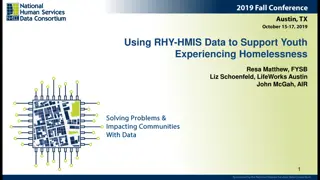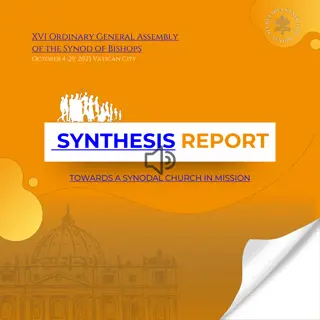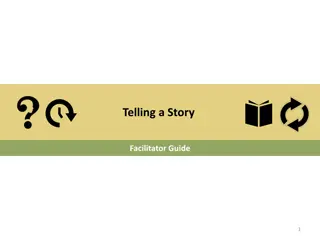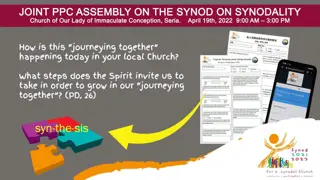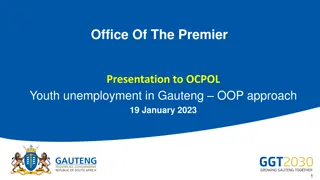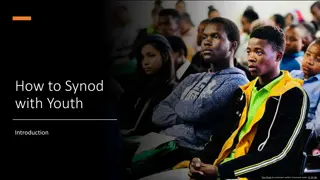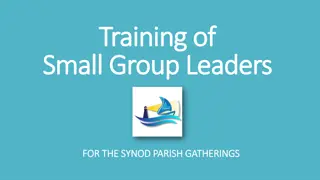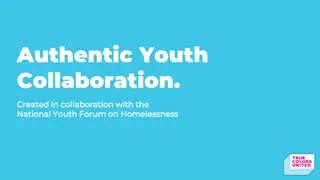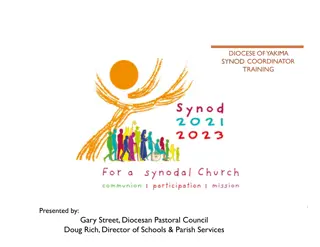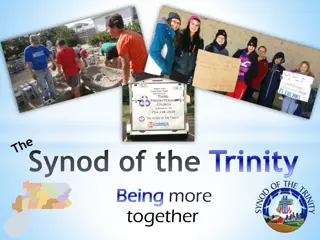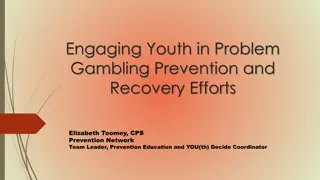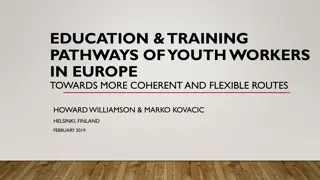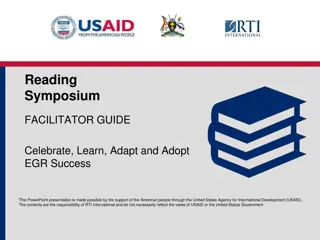Facilitator's Guide for How to Synod for Youth
This facilitator's guide explores the concept of youth in the Church, highlighting the importance of listening to young people and fostering their contributions. It delves into the goals of engagement, the role of the facilitator, communication strategies, and the significance of journeying together towards a synodal Church. Emphasis is placed on empowering youth to voice their thoughts, seek catharsis, forgiveness, and community, and contribute to the Church's growth.
Download Presentation

Please find below an Image/Link to download the presentation.
The content on the website is provided AS IS for your information and personal use only. It may not be sold, licensed, or shared on other websites without obtaining consent from the author. Download presentation by click this link. If you encounter any issues during the download, it is possible that the publisher has removed the file from their server.
E N D
Presentation Transcript
How to Synod For Youth Facilitators Guide This Photo by Unknown author is licensed under CC BY-ND.
34. Youth is more than simply a period of time; it is a state of mind. That is why an institution as ancient as the Church can experience renewal and a return to youth at different points in her age-old history. Indeed, at the most dramatic moments of her history, she feels called to return with all her heart to her first love. Recalling this truth, the Second Vatican Council noted that, enriched by a long and living history, and advancing towards human perfection in time and the ultimate destinies of history and of life, the Church is the real youth of the world . In her, it is always possible to encounter Christ the companion and friend of youth .
Goals of the Engagement The Role of the Facilitator Overview of Presentation Opportunities and Challenges Guidelines for facilitating Conversations with and for Children and Adolescents
65. The Synod recognized that the members of the Church do not always take the approach of Jesus. Rather than listening to young people attentively, all too often, there is a tendency to provide prepackaged answers and ready-made solutions, without allowing their real questions to emerge and facing the challenges they pose . Yet once the Church sets aside narrow preconceptions and listens carefully to the young, this empathy enriches her, for it allows young people to make their own contribution to the community, helping it to appreciate new sensitivities and to consider new questions .
TheBig Question How does this journeying together" take place today on different levels (from the local level to the universal one), allowing the Church to proclaim the Gospel? and what steps are the Spirit inviting us to take in order to grow as a synodal Church?
At the end of this experience a young person should describe it as An opportunity to voice their hearts and minds The best of Church Catharsis, Forgiveness and Reconciliation Community A desire to see the Church improve Witness to the joys and pains for faith Synodal: Listening, Discernment, and Participation
not because they are the future Church because they are the Church Engaging Youth in the Synod The NOW of God
Embodied & Active Prioritize the voice of the young person Authentically presented Diverse Non-gathered options Developmentally appropriate Technology enabled Engagement that is...
The Role of the Facilitators
The role of a facilitator is to help participants engage with one another in meaningful dialogue on the given topic or question. The facilitator is not the center of conversation but rather a guide for the conversation. It is important to select and train excellent facilitators for this listening process. The Role of the The Role of the Facilitator Facilitator
Are at home with their Catholic faith Are prayerful and reflective Have strong interpersonal and communication skills Are discerning and can demonstrate situation awareness Are willing participants in the synodal process Strong facilitators Strong facilitators are people who: are people who: Are able to maintain a big picture view without injecting their personal agenda Can focus a conversation clarify, reframe, paraphrase Can connect participants with each other without becoming the center of the conversation. Can manage their emotions authentically and with temperance Recognizes and works to manage personal bias Allow Allow conversation between participants
Reflection Reflection What are issues that you find difficult to discuss or that make you emotional (positively or negatively)?
Opportunities and Opportunities and Opportunities and Opportunities and Challenges Challenges Challenges Challenges
Responding to a speaker who talks of the trauma of abuse by a minister of the Church Facilitators must take into account that those traumas are real and deserve our compassion above all. Challenges Challenges Responding to people with agendas When a facilitator can recognize this, there are approaches that may help keep the conversation on track. Responding to people with no filters
Guidelines for Engagement
PREPARATION ENGAGEMENT FOLLOW UP
Preparation What you do up to the day before the session is scheduled
Set clear expectations, process and purpose early and keep on topic. Set the tone as prayerful and reflective. - What may be reported out of the synodal consultation is not what we all agree upon, but what we discern as having potential to be the will of God for the Church in the future. Even conflicting perspectives can be reported. Preparation & Preparation & Clarity of Clarity of Purpose Purpose Be clear that the synodal consultations are not equipped to provide the support that those who suffered abuse need, and at the same time we need to hear those who choose to raise the abuses by the Church as pertinent to our considerations of a future Church. Be clear that our purpose is to help form a more synodal and listening Church and that means keeping an open mind so the Spirit can work in all of us. Don t let our personal agendas limit our conversations.
Questions Opportunities for exploration Be and provide a mirror Tools for Tools for Engagement Engagement Listening Laughter Primarily: THE SELF Primarily: THE SELF Security Information Share experiences
Creativity Facilitators should also Gentle Wisdom use: Genuine Love
Reporting the fruits of your synodal consultations: Reporting is both horizontal reporting to the participants and community and vertical reporting to the diocese, the AEC Bishops and to the Holy Father and Synod of Bishops in Rome. Follow Up Feedback mechanisms will be implemented for facilitators to easily capture and report the fruit of discussions. This information will be reported to participants, pastoral councils, pastoral staff, and the faith community as a whole.





